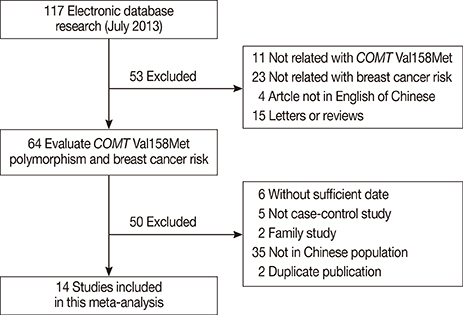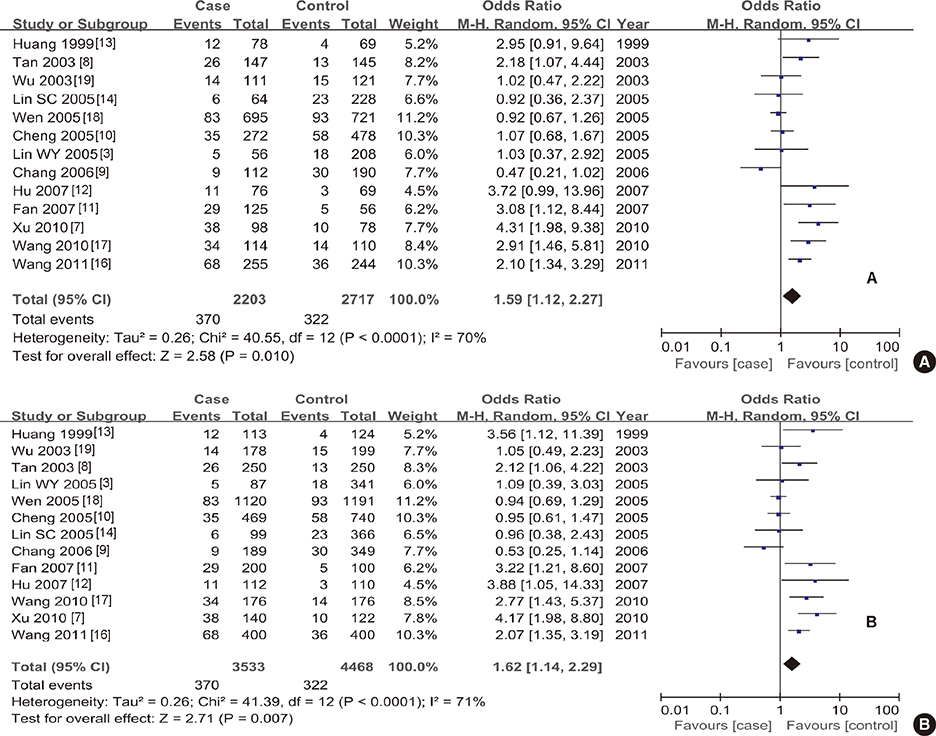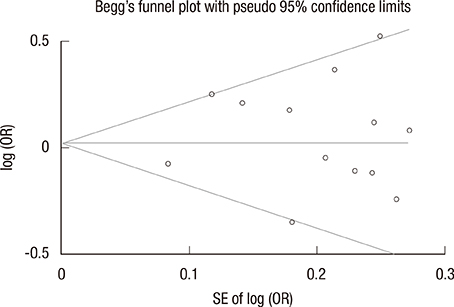J Breast Cancer.
2014 Jun;17(2):149-156.
The Catechol-O-Methyltransferase Val158Met Polymorphism Contributes to the Risk of Breast Cancer in the Chinese Population: An Updated Meta-Analysis
- Affiliations
-
- 1Department of Pathology and the Key Laboratories for Xinjiang Endemic and Ethnic Diseases, Shihezi University School of Medicine, Shihezi, China.
Abstract
- PURPOSE
Catechol-O-methyltransferase (COMT) enzyme plays a central role in estrogen-induced carcinogenesis. Emerging evidence from association studies has revealed that the functional Val158Met polymorphism (rs4680 G>A) of the Catechol-O-methyltransferase gene (COMT) has been implicated in susceptibility to breast cancer in the Chinese population, while results of individual published studies remain inconclusive and inconsistent. To assess this association in the Chinese population, a meta-analysis was performed.
METHODS
Eligible studies were searched on MEDLINE, Embase, Cochrane Library, China National Knowledge Infrastructure, and the Chinese Biomedicine Database. Odds ratios (ORs) with their corresponding 95% confidence intervals (CIs) were pooled to assess the association between COMT polymorphisms and the risk of breast cancer using RevMan 5.2 and Stata 12.0 software.
RESULTS
The meta-analysis included 14 eligible studies, with a total of 4,626 breast cancer cases and 5,637 controls. Overall, the COMT Val158Met polymorphism (rs4680 G>A) was significantly associated with an increased risk of breast cancer in several genetic models (A/A vs. G/G: OR, 1.59, 95% CI, 1.12-2.27; A/A vs. G/A+G/G: OR, 1.62, 95% CI, 1.14-2.29; A vs. G: OR, 1.15, 95% CI, 1.00-1.32), and a subgroup analysis according to menopausal status showed that this association was especially evident among premenopausal Chinese women (A/A vs. G/G: OR, 1.87, 95% CI, 0.99-3.54; A/A vs. G/A+G/G: OR, 1.94, 95% CI, 1.03-3.63).
CONCLUSION
The results of this meta-analysis indicated that COMT Val158Met variants contribute to breast cancer susceptibility in the Chinese population, particularly among premenopausal women.
MeSH Terms
Figure
Reference
-
1. Wang YC, Wei LJ, Liu JT, Li SX, Wang QS. Comparison of cancer incidence between China and the USA. Cancer Biol Med. 2012; 9:128–132.2. Qin X, Peng Q, Qin A, Chen Z, Lin L, Deng Y, et al. Association of COMT Val158Met polymorphism and breast cancer risk: an updated meta-analysis. Diagn Pathol. 2012; 7:136.
Article3. Lin WY, Chou YC, Wu MH, Jeng YL, Huang HB, You SL, et al. Polymorphic catechol-O-methyltransferase gene, duration of estrogen exposure, and breast cancer risk: a nested case-control study in Taiwan. Cancer Detect Prev. 2005; 29:427–432.
Article4. Lajin B, Hamzeh AR, Ghabreau L, Mohamed A, Al Moustafa AE, Alachkar A. Catechol-O-methyltransferase Val 108/158 Met polymorphism and breast cancer risk: a case control study in Syria. Breast Cancer. 2013; 20:62–66.
Article5. Wen W, Ren Z, Shu XO, Cai Q, Ye C, Gao YT, et al. Expression of cytochrome P450 1B1 and catechol-O-methyltransferase in breast tissue and their associations with breast cancer risk. Cancer Epidemiol Biomarkers Prev. 2007; 16:917–920.
Article6. Yager JD. Catechol-O-methyltransferase: characteristics, polymorphisms and role in breast cancer. Drug Discov Today Dis Mech. 2012; 9:e41–e46.
Article7. Xu YJ, Ge YL, Zhang JY, Li FN, Zheng Z. Polymorphism of COMT, p21 and NuMA in sporadic breast cancer. Chin J Clin. 2010; 4:591–596.8. Tan W, Qi J, Xing DY, Miao XP, Pan KF, Zhang L, et al. Relation between single nucleotide polymorphism in estrogen-metabolizing genes COMT, CYP17 and breast cancer risk among Chinese women. Zhonghua Zhong Liu Za Zhi. 2003; 25:453–456.9. Chang TW, Wang SM, Guo YL, Tsai PC, Huang CJ, Huang W. Glutathione S-transferase polymorphisms associated with risk of breast cancer in southern Taiwan. Breast. 2006; 15:754–761.
Article10. Cheng TC, Chen ST, Huang CS, Fu YP, Yu JC, Cheng CW, et al. Breast cancer risk associated with genotype polymorphism of the catechol estrogen-metabolizing genes: a multigenic study on cancer susceptibility. Int J Cancer. 2005; 113:345–353.
Article11. Fan Y, Feng Y, Wang L, Wang Y, Fu L. The relationship between catechol-O-methyltransferase (COMT) polymorphisms and the development of breast cancer. Chin J Clin Oncol. 2007; 34:430–433.12. Hu Z, Song CG, Lu JS, Luo JM, Shen ZZ, Huang W, et al. A multigenic study on breast cancer risk associated with genetic polymorphisms of ER Alpha, COMT and CYP19 gene in BRCA1/BRCA2 negative Shanghai women with early onset breast cancer or affected relatives. J Cancer Res Clin Oncol. 2007; 133:969–978.
Article13. Huang CS, Chern HD, Chang KJ, Cheng CW, Hsu SM, Shen CY. Breast cancer risk associated with genotype polymorphism of the estrogen-metabolizing genes CYP17, CYP1A1, and COMT: a multigenic study on cancer susceptibility. Cancer Res. 1999; 59:4870–4875.14. Lin SC, Chou YC, Wu MH, Wu CC, Lin WY, Yu CP, et al. Genetic variants of myeloperoxidase and catechol-O-methyltransferase and breast cancer risk. Eur J Cancer Prev. 2005; 14:257–261.
Article15. Shrubsole MJ, Lu W, Chen Z, Shu XO, Zheng Y, Dai Q, et al. Drinking green tea modestly reduces breast cancer risk. J Nutr. 2009; 139:310–316.
Article16. Wang Q, Li H, Tao P, Wang YP, Yuan P, Yang CX, et al. Soy isoflavones, CYP1A1, CYP1B1, and COMT polymorphisms, and breast cancer: a case-control study in southwestern China. DNA Cell Biol. 2011; 30:585–595.
Article17. Wang Q, Wang YP, Li JY, Yuan P, Yang F, Li H. Polymorphic catechol-O-methyltransferase gene, soy isoflavone intake and breast cancer in postmenopausal women: a case-control study. Chin J Cancer. 2010; 29:683–688.
Article18. Wen W, Cai Q, Shu XO, Cheng JR, Parl F, Pierce L, et al. Cytochrome P450 1B1 and catechol-O-methyltransferase genetic polymorphisms and breast cancer risk in Chinese women: results from the shanghai breast cancer study and a meta-analysis. Cancer Epidemiol Biomarkers Prev. 2005; 14:329–335.
Article19. Wu AH, Tseng CC, Van Den Berg D, Yu MC. Tea intake, COMT genotype, and breast cancer in Asian-American women. Cancer Res. 2003; 63:7526–7529.20. He XF, Wei W, Li SX, Su J, Zhang Y, Ye XH, et al. Association between the COMT Val158Met polymorphism and breast cancer risk: a meta-analysis of 30,199 cases and 38,922 controls. Mol Biol Rep. 2012; 39:6811–6823.
Article21. Ding H, Fu Y, Chen W, Wang Z. COMT Val158Met polymorphism and breast cancer risk: evidence from 26 case-control studies. Breast Cancer Res Treat. 2010; 123:265–270.
Article22. Mao C, Wang XW, Qiu LX, Liao RY, Ding H, Chen Q. Lack of association between catechol-O-methyltransferase Val108/158Met polymorphism and breast cancer risk: a meta-analysis of 25,627 cases and 34,222 controls. Breast Cancer Res Treat. 2010; 121:719–725.
Article23. Higgins JP, Thompson SG, Deeks JJ, Altman DG. Measuring inconsistency in meta-analyses. BMJ. 2003; 327:557–560.
Article24. DerSimonian R, Laird N. Meta-analysis in clinical trials. Control Clin Trials. 1986; 7:177–188.
Article25. Mantel N, Haenszel W. Statistical aspects of the analysis of data from retrospective studies of disease. J Natl Cancer Inst. 1959; 22:719–748.26. Goodman JE, Jensen LT, He P, Yager JD. Characterization of human soluble high and low activity catechol-O-methyltransferase catalyzed catechol estrogen methylation. Pharmacogenetics. 2002; 12:517–528.
Article27. Dawling S, Roodi N, Mernaugh RL, Wang X, Parl FF. Catechol-O-methyltransferase (COMT)-mediated metabolism of catechol estrogens: comparison of wild-type and variant COMT isoforms. Cancer Res. 2001; 61:6716–6722.28. Srivastava K, Srivastava A. Comprehensive review of genetic association studies and meta-analyses on miRNA polymorphisms and cancer risk. PLoS One. 2012; 7:e50966.
Article
- Full Text Links
- Actions
-
Cited
- CITED
-
- Close
- Share
- Similar articles
-
- Impaired Set-Shifting Ability in Patients with Eating Disorders, Which Is Not Moderated by Their Catechol-O-Methyltransferase Val158Met Genotype
- Association Study of Val158Met Polymorphism of Catechol-O-Methyltransferase Gene and Cognitive Markers in Schizophrenia
- No Association Between Functional Polymorphisms in COMT and MTHFR and Schizophrenia Risk in Korean Population
- Catechol-O-Methyltransferase Gene Polymorphism of Attention Deficit Hyperactivity Disorder in Korean Population
- Catechol-O-Methyltransferase Gene Polymorphism(Valine/Methionine) Associated Neither with Schizophrenia Nor with Bipolar Disorder in a Korean Population




